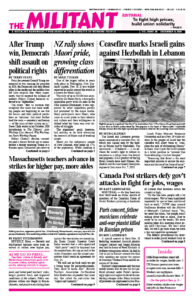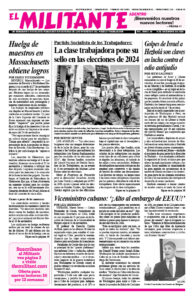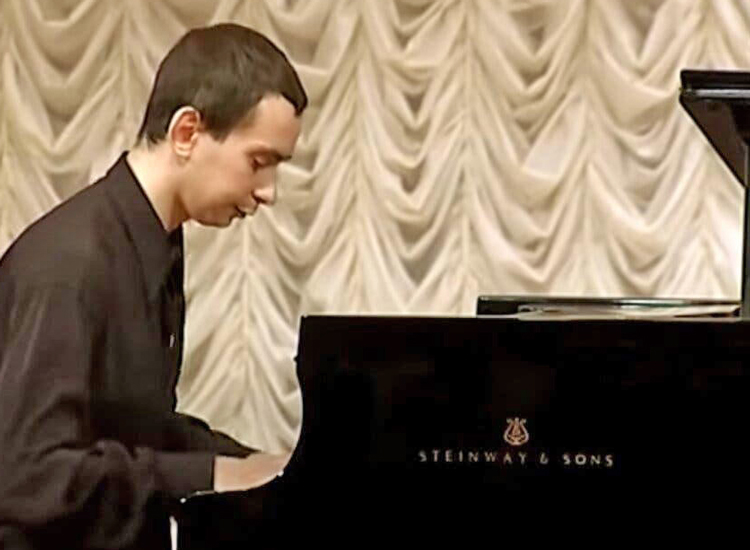A special concert in Paris Nov. 18 featuring renowned classical pianists Grigory Sokolov and Sergei Babayan was held in honor of Pavel Kushnir. A brilliant young piano soloist, he died in July in jail in Russia’s remote Far East after speaking out against the regime of President Vladimir Putin and his invasion of Ukraine.
Kushnir’s imprisonment only became widely known after he was the first political prisoner under Putin’s increasingly repressive regime to die while conducting a hunger strike. Many hundreds of protesters are imprisoned across Russia for their opposition to the Kremlin and its Ukraine war.
Kushnir’s death at age 39 only came to light when one of his cellmates sent a message out saying “our comrade” died July 27. “The best pianist in the region,” the letter said, was “charged under the same article as us, 205.2 [promotion of terrorism].” He added, “They drove him to it. He didn’t even live to see the trial.”
“Pavel Kushnir chose internal exile and dared to speak out against war. He paid for it with his life,” said an open letter in support of the concert signed by some 60 internationally renowned conductors, composers and pianists. Signatories included Martha Argerich, Daniel Barenboim, Kirill Gerstein, Paavo Jarvi, Evgeny Kissin, Gidon Kremer, Alexander Melnikov, Kirill Petrenko, Simon Rattle, Alexandre Tharaud, Christian Thielmann and dozens more.
This was the first time since Putin’s murderous war began nearly three years ago that such globally famous musicians have so strongly supported an anti-war Russian performer. Some of the signers live and work in Russia.
“This is an incredibly brave act on their part,” pianist Olga Shkrygunova, a childhood friend of Kushnir, said. “Pavel has become a symbol of light, honest and uncompromising. He resonates in everyone in his own way.”
The concert program opened with Frederic Chopin’s Mazurkas. They express the Polish-French composer’s nationalist resistance to the 19th century occupation of Poland under Russia’s czars.
Kushnir, who was Jewish, strongly identified with this artistic defiance. In the months before his arrest in Birobidzhan, the capital of what was originally established as a Jewish autonomous region in Siberia, he dedicated his weekly radio program there to Chopin’s piano works. Kushnir believed the arts should be free and accessible to everyone.
Considered a musical prodigy, Kushnir had studied at the elite Tchaikovsky Conservatory in Moscow. In 2011 and 2012 he joined mass rallies as Putin’s regime became increasingly authoritarian. In 2014 he denounced Moscow’s seizure of Crimea.
Moscow’s assault on Ukraine sparked sizable protests, which were increasingly repressed by harsh police measures. Kushnir turned to posting against the war online. Shkrygunova remembered that he said, “Two nations are dying in this war. It must be stopped as soon as possible.”
Breadth of Kushnir’s activities
It was only after his death that much about his activities became known. In addition to being a remarkable pianist, Kushner was an oppositionist making personal protests while reaching out to fellow dissidents, like the female performance art group Pussy Riot. He was a writer who left behind two handwritten novels. His Russian Cutup is an anti-war tale portraying the Putin police state as a giant pig. After his death, a group of his newly acquainted supporters worked overtime to publish it.
Shkrygunova said he refused to join her in Germany, even as Putin’s vice tightened. However, he avoided being pressed into performing at pro-regime war concerts by playing “far from the capitals.”
His last job was as pianist for the philharmonic orchestra in Birobidzhan.
Kushnir’s active opposition to the regime and its war came to the notice of the police when he posted online a video Jan. 5 entitled “Life,” where he expressed outrage at the 2022 massacre of civilians by Russian troops in Bucha, near Kyiv. He said, “Down with the war in Ukraine, down with Putin’s fascist regime. Freedom for all political prisoners!”
He was seized by masked men in Birobidzhan and detained on charges of “terrorist activity.” He responded with a hunger strike. After two months he began to refuse liquids as well as food. He died six days later. A picture of his body in the coffin shows a black eye and bloodied lips. Friends believe he was beaten.
Other performers bemoaned the fact they hadn’t known of his activities and arrest. “We could not pool money to send him a lawyer — we just didn’t know,” Svetlana Kaverzina, an opposition politician in Novosibirsk, central Russia, wrote on Telegram. “We didn’t write letters of support — we didn’t know.”
In a video he posted not long before his death, Kushnir said, “We will not bow to the Beast.” He urged his supporters to continue the struggle. “There is a future,” he said. “Let’s go all the way. Stay true to our past.”
After news of his death, a spontaneous memorial to him appeared at the monument to victims of political repression in Novosibirsk.
Videos of Kushnir’s performance of Sergei Rachmaninoff’s Preludes and other works are available on YouTube.


